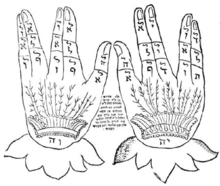Sephirot[edit]
The Sephirot (also spelled "sefirot"; singular sefirah) are the ten emanations and attributes of God with which he continually sustains the existence of the universe. The Zohar and other Kabbalistic texts elaborate on the emergence of the sephirot from a state of concealed potential in the Ein Sof until their manifestation in the mundane world.
In particular, Moses ben Jacob Cordovero (known as "the Ramak"), describes how God emanated the myriad details of finite reality out of the absolute unity of Divine light via the ten sephirot, or vessels.[2]: 6
Comparison of the Ramak's counting with Luria's, describes dual rational and unconscious aspects of Kabbalah. Two metaphors are used to describe the sephirot, their theocentric manifestation as the Trees of Life and Knowledge, and their anthropocentric correspondence in man, exemplified as Adam Kadmon. This dual-directional perspective embodies the cyclical, inclusive nature of the divine flow, where alternative divine and human perspectives have validity. The central metaphor of man allows human understanding of the sephirot, as they correspond to the psychological faculties of the soul, and incorporate masculine and feminine aspects after Genesis 1:27 ("God created man in His own image, in the image of God He created him, male and female He created them"). Corresponding to the last sefirah in Creation is the indwelling shekhinah (Feminine Divine Presence). Downward flow of divine Light in Creation forms the supernal Four Worlds; Atziluth, Beri'ah, Yetzirah and Assiah manifesting the dominance of successive sephirot towards action in this world. The acts of man unite or divide the Heavenly masculine and feminine aspects of the sephirot, their anthropomorphic harmony completing Creation. As the spiritual foundation of Creation, the sephirot correspond to the names of God in Judaism and the particular nature of any entity.
Ten Sephirot as process of Creation[edit]
According to Lurianic cosmology, the sephirot correspond to various levels of creation (ten sephirot in each of the Four Worlds, and four worlds within each of the larger four worlds, each containing ten sephirot, which themselves contain ten sephirot, to an infinite number of possibilities),[66] and are emanated from the Creator for the purpose of creating the universe. The sephirot are considered revelations of the Creator's will (ratzon),[67] and they should not be understood as ten different "gods" but as ten different ways the one God reveals his will through the Emanations. It is not God who changes but the ability to perceive God that changes.
Ten Sephirot as process of ethics[edit]
Divine creation by means of the Ten Sephirot is an ethical process. They represent the different aspects of Morality. Loving-Kindness is a possible moral justification found in Chessed, and Gevurah is the Moral Justification of Justice and both are mediated by Mercy which is Rachamim. However, these pillars of morality become immoral once they become extremes. When Loving-Kindness becomes extreme it can lead to sexual depravity and lack of Justice to the wicked. When Justice becomes extreme, it can lead to torture and the Murder of innocents and unfair punishment.
"Righteous" humans (tzadikim plural of Tzadik) ascend these ethical qualities of the ten sephirot by doing righteous actions. If there were no righteous humans, the blessings of God would become completely hidden, and creation would cease to exist. While real human actions are the "Foundation" (Yesod) of this universe (Malchut), these actions must accompany the conscious intention of compassion. Compassionate actions are often impossible without faith (Emunah), meaning to trust that God always supports compassionate actions even when God seems hidden. Ultimately, it is necessary to show compassion toward oneself too in order to share compassion toward others. This "selfish" enjoyment of God's blessings but only in order to empower oneself to assist others is an important aspect of "Restriction", and is considered a kind of golden mean in kabbalah, corresponding to the sefirah of Adornment (Tiferet) being part of the "Middle Column".
Moses ben Jacob Cordovero, wrote Tomer Devorah (Palm Tree of Deborah), in which he presents an ethical teaching of Judaism in the kabbalistic context of the ten sephirot. Tomer Devorah has become also a foundational Musar text.[68]


